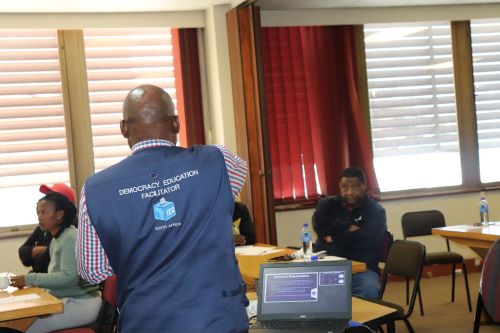Planact: A History of Commitment to Democracy and Responsive Inclusive People-Centred Governance Processes
Planact’s history demonstrates an organisation alive to the vital importance of ‘local democracy as an essential process towards building sustainable communities, competitive economies and service delivery.’ These elements are essential to bring about good governance and the delivery of the socio-economic rights as enshrined in South Africa’s constitution – one of the most progressive globally. The constitution entrenches the right to meaningful participation as fundamental to democracy.
This commitment to fostering democracy finds its expression in our mission as an organisation that continues to support participatory local government processes and transparent and accountable governance systems and processes across all spheres of government.
With this backdrop, Planact sought to meaningfully play a role in the 2024 elections through interventions that sought to build awareness and knowledge around the elections as a key process to play a part in charting a new course for the country through a commitment to democracy and democratic institutions.
The workshops were further designed to promote meaningful participation to positively influence electoral processes and outcomes and support informed decision-making so that the elections take on real meaning.
Observing Elections
As South Africans go to the 2024 polls, some of Planact’s staff and community members will observe what is being termed a significant election. Many reasons are touted for describing it in those terms, including that it is likely to be the beginning of election alliances as a more mainstream part of our politics, and most certainly set us on the path to more coalitions forming in the coming years.
According to the United Nations, ‘election observation is a valuable tool for improving the quality of elections,’:
“Observers help build public confidence in the honesty of electoral processes. Observation can help promote and protect the civil and political rights of participants in elections…When observers issue positive reports, it builds trust in the democratic process and enhances the legitimacy of the governments that emerge from elections.”
Observers, perform an important role in ensuring that the elections are transparent, free, and fair and that voters, political parties and candidates accept the outcome.
Our staff and community observers attended comprehensive training provided by the Independent Electoral Commission (IEC) to take part as observers in the 2024 elections.
Voter Education and Awareness
In the run-up to the elections, Planact, as part of its civic education outreach, convened a series of voter education workshops to ensure members of our communities in the City of Joburg, the City of Tshwane and the municipality of Emalahleni had the opportunity to strengthen their knowledge of election-related matters. The IEC and partner-led presentations on a range of aspects of elections, including who can vote, information and an explanation of the new ballot system reflected in three ballot papers, the Section 24A special voter provisions, voting day processes, counting and results collation, the code of conduct as well as the important role of observers and related matters made for a rich learning experience.
Lively discussions were held. These brought about a deeper understanding of the role of the IEC as a neutral electoral body in charge of managing elections and an institution governed by legislation under Chapter 9 of the Constitution.
The workshop was framed as a way to reflect on the importance of governance in an election cycle and a recognition that elections need to be understood as a process towards deepening democracy but do not necessarily guarantee good governance, which is a tougher and more complex standard to achieve and rests on the key pillars of transparency and accountability and a clear commitment to acting in the interests of the people.
Are people losing faith in Democracy?
One of our partner organisations highlighted the statistics that elucidate the ‘increasing disenchantment’ of South Africans with democracy. The decline in support for democracy is linked to what is seen as the non-delivery of people’s socio-economic expectations and is related to how governance is occurring. Indeed, Afrobarometer data shows that only 25% of South Africans are either satisfied or fully satisfied with how democracy functions in the country. According to the Human Science Research Council (HSRC), levels of contentment with how democracy is performing have fallen from 62% in 2004 to 26% in 2022.
Media: for good or for bad?
An area included in the workshop training programmes was the role of the media, including social media as an important avenue for sharing information but also a threat to a free, fair and impartial media environment in the face of misinformation and disinformation. As Media Monitoring Africa (MMA) highlights, ‘During an election period, the media plays a critical role in disseminating information to the electorate…to facilitate informed decision-making when citizens exercise their vote at the election polls’.
Closing Thoughts
What is certain in this election is that while the electorate pursues what may be termed electoral democracy and a clear expression of established political rights it is both the pursuit of good governance that delivers a better life and its clear history of shortcomings that will be the determinant of voting patterns and a key deliverable sought from the 2024 elections.

